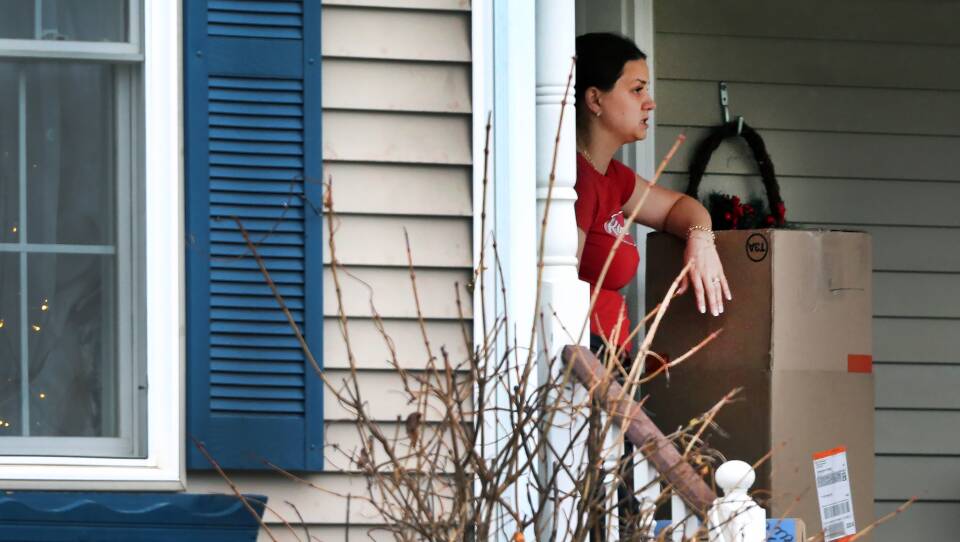Last week news broke of a conspiracy to smuggle sensitive American electronics and other technology into Russia. One of the alleged coconspirators is Alexey Brayman, a lawful permanent resident of the United States who appeared to be living quietly in Merrimack, New Hampshire, with his wife Daria. Northeastern law professor and GBH legal analyst Daniel Medwed joined Morning Edition co-host Jeremy Siegel to talk about the case. This transcript has been lightly edited.
Jeremy Siegel: This one is a doozy. Straight out of television. Let's start with the basic scheme here: electronics, technology going to Russia. How did this smuggling ring work?
Daniel Medwed: It's an outtake from "The Americans," right? I'll take a stab at it. So starting in 2014, after the Russians invaded Crimea in Ukraine, the U.S. imposed stiffer requirements, regulations and licensing on the transport — or really, the export — of certain technology, goods and other equipment to Russia. The primary goal here, of course, was to stem the flow of components that could be used for military purposes. So to circumvent these restrictions, two companies in Moscow, essentially government contractors, set up an elaborate network of people to smuggle in these components. Specifically, seven folks allegedly used fabricated shipping documents, invoices, shell companies, bank accounts and various intermediaries to effectuate this scheme. That's sort of the overview.
More Local News
Siegel: What are the criminal charges that are facing the people involved in this?
Medwed: Last week, the Department of Justice unsealed a 45-page indictment with 16 different counts. All seven of the defendants are listed in count one, which is the conspiracy to defraud the United States. So they're all facing that charge. In terms of the other counts, they include assorted other conspiracy charges: Conspiracy to commit wire fraud, bank fraud and money laundering, as well as the crimes of smuggling goods out of the United States and failing to file certain electronic export information.
Now, if convicted, these defendants are looking at a maximum sentence of 30 years in prison. So these are pretty serious charges. And while, of course, we should maintain the presumption of innocence, all defendants deserve that — my hunch is that the Department of Justice would not have unsealed this indictment unless it felt like it had a pretty airtight case, given the potential diplomatic ramifications.
Siegel: Daniel, tell us more about the specific allegations against Alexey Brayman, the New Hampshire resident we're talking about here.
Medwed: Sure. So on the surface, Brayman and his wife ran a very pedestrian crafts company out of their home in Merrimack, New Hampshire, where they would produce and disseminate decorative lights through an Etsy shop. But underneath the surface, according to the indictment, Brayman used this as a cover to distribute and disseminate high tech components to an intermediary in Estonia, a Federal Security Service agent, FSB agent, who would then smuggle the goods from Estonia into Russia. Now, by my count, Brayman is facing five of the 16 charges in this indictment. So he's looking at serious time as well.
Siegel: So this sounds like it's out of "The Americans." One of the core components of that show is that both the husband and wife in that show are Russian spies. What about in this real life situation, Brayman's wife, is she facing any charges at this point?
Medwed: You know, fact and fiction are emerging here. She is not facing any charges in the indictment. She was not mentioned. So that leads to one of two possibilities. The first possibility, of course, is that she's innocent, that she was oblivious to what was going on, that she lacked what's called a culpable criminal mental state. She didn't intend to participate in the conspiracy or even know about it. That strikes me, however, as somewhat unlikely given the alleged volume of goods that were going through this small three-bedroom house in a subdivision in New Hampshire.
So I think the second possibility is more likely: That she is what's called an unindicted coconspirator. That's a term that gained traction in the 1970s. And the idea is that someone might be involved, but hasn't necessarily been indicted yet. Sometimes you can name and unindicted coconspirator in indictments or in press releases. But the U.S. Attorney's Manual, which governs federal prosecutors, advises against doing that. The idea is you want to be able to negotiate surreptitiously with an unindicted coconspirator to see whether that person might have information against the coconspirators. And that they can maybe testify against them in exchange for immunity or leniency.
"My hunch is that the Department of Justice would not have unsealed this indictment unless it felt like it had a pretty airtight case, given the potential diplomatic ramifications."-Daniel Medwed, GBH News legal analyst
Siegel: So most of my legal knowledge comes from movies or from TV shows. But one thing I know about because of all of my law research in TV and movies is marital privilege. This this thing where, you know, someone might marry somebody to prevent them from testifying, or their spouse isn't able to testify in a case because they're married. How does marital privilege work here? Like, can one spouse be forced to testify against the other in a criminal case like this?
Medwed: Shockingly, TV doesn't quite capture all of the nuances of marital privilege. There are two marital privileges, and I'll describe how they work. The first one is called the spousal testimonial privilege. I tell my students to think of it as STP, stop in the name of love, that famous Supremes song. And the idea is that if two people are married and one of them is charged with a crime, you can't force the other spouse, the witness spouse, to testify against the defendant spouse because it would jeopardize the sanctity of the marriage. But notably, that privilege is held exclusively in the hands of the witness spouse. So what that means here is that Daria could choose whether she wants to testify against Alexey or not. Alexey couldn't block her from doing so. That's the spousal testimonial privilege. So if she has an incentive, maybe an immunity deal to testify against him, it's her prerogative to waive her privilege and testify.
If she were to testify, then she could recount any observations of his behavior, conversations they had before the marriage. But because of a second marital privilege that's held by both of them, he could maybe block her from disclosing confidential communications they had between the two of them during the marriage. Now the plot thickens in this drama here because there's an exception to the marital confidential communications privilege, which is if the communications related to an ongoing crime or fraud. So it's possible that prosecutors could ask Daria if she chooses to testify even about confidences that she shared with her husband, if they relate explicitly to this scheme.
Siegel: So, their private conversations, if they had them about the smuggling ring, are not privileged.
Medwed: Depending on when they occurred and whether they related to ongoing or future acts, as opposed to past acts, yes.







